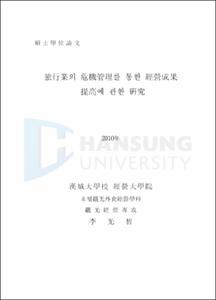旅行業의 危機管理를 통한 經營成果 提高에 관한 硏究
= A study on manageability and improvement through crisis management of the tourist industry
- Type
- Thesis
- Advisor
- 허진
- Department
- 경영대학원 호텔관광외식경영학과
- Issued Date
- 2010
- Publisher
- 한성대학교 경영대학원
- Keyword
- 여행업의 위기관리를 통한 경영성과 제고에 관한 연구
- Appears in Collections:
- 호텔관광외식경영학과 > 1. Thesis
- Files in This Item:
-
-
Download
 000000545014.pdf
기타 데이터 / 734.03 kB / Adobe PDF
000000545014.pdf
기타 데이터 / 734.03 kB / Adobe PDF
-
Items in Repository are protected by copyright, with all rights reserved, unless otherwise indicated.